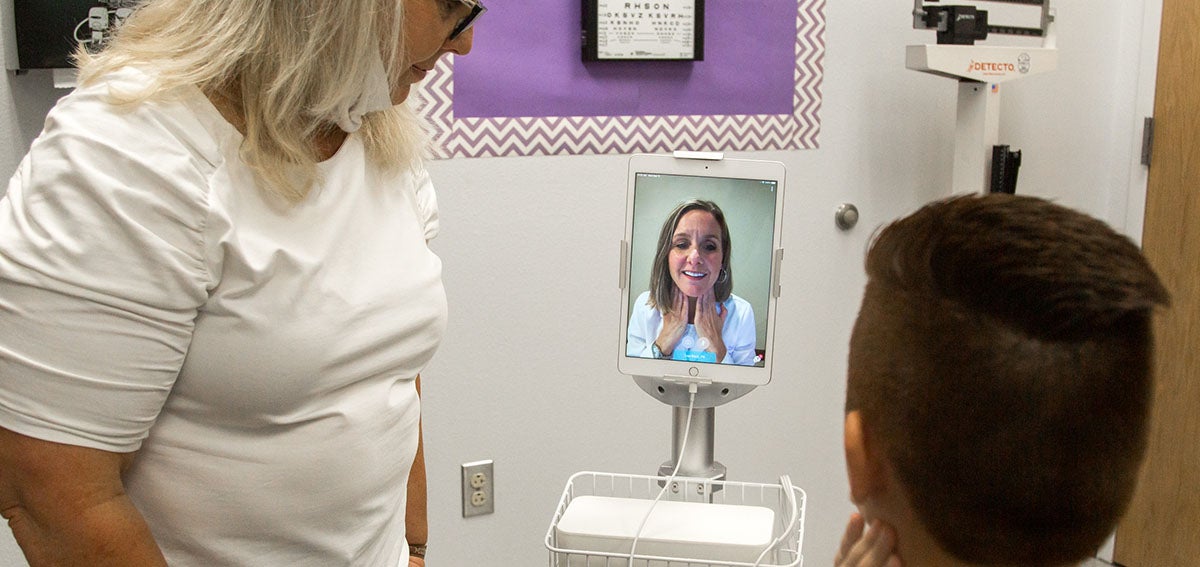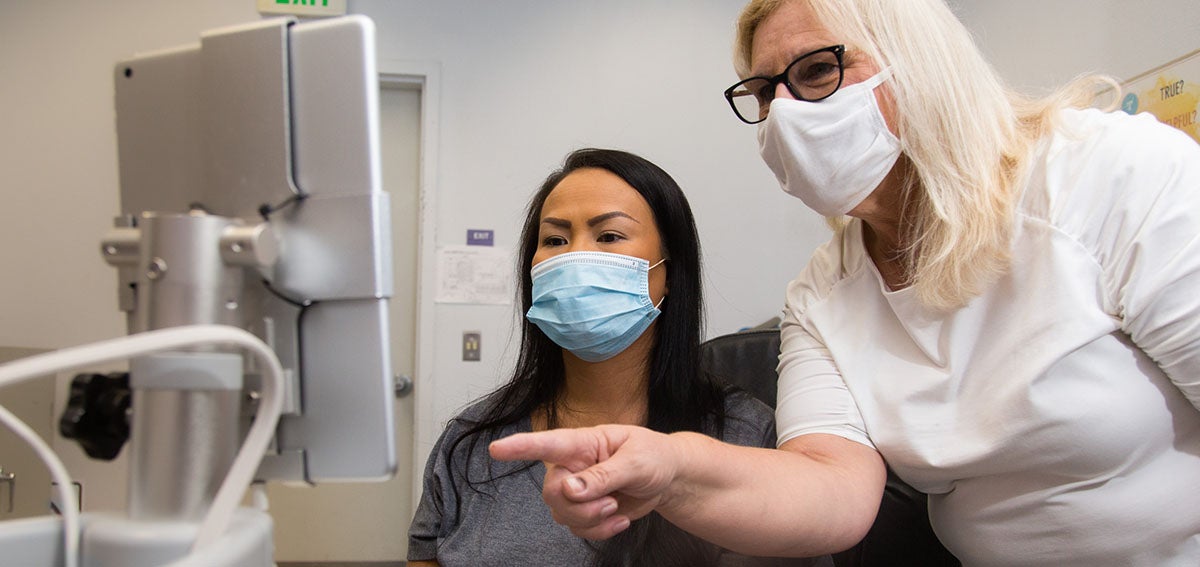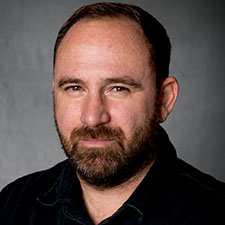
Jennifer Maldonado, a licensed clinical social worker, spent the summer counseling high schoolers in Stanislaus County as part of a pilot program using virtual therapy to close the gap in mental health services for young people.
The purpose of the pilot — led by San Francisco–based digital health start-up Hazel Health and the school district — was to hash out the best practices for a school-based virtual mental health model to scale the program to schools nationwide.
Right away, Maldonado discovered the students referred to her through the school were experiencing serious issues, such as a recent suicide in the family, self-harm, or severe depression.
“Students had a lot more trauma and historical mental health issues than I was expecting,” said Maldonado, who has worked in community mental health for more than 20 years. In a county with a population that is nearly half Latinx residents, the need for culturally competent mental health services is great — and largely unmet.
Concerned, Maldonado and the other therapists in the pilot initially focused on making sure the students were safe and then worked to stabilize them by teaching them coping skills during the six virtual sessions available to each student. When more than six visits are needed, a Hazel case manager ensures the child is connected with a local provider.
Hazel Health’s efforts to support the school-based mental health needs of young people are addressing a long-recognized crisis affecting children and youth nationwide. Over the last decade, the mental health needs of young people have been escalating (PDF), as evidenced by dramatic increases in suicide, self-harm, and depression. At the same time, access to mental health treatment has lagged far behind, disproportionately affecting families with low incomes and children of color. As the pandemic has increased awareness of the importance of mental health and the rapid adoption of telemedicine, that situation appears to be shifting.
“Technology and innovation are most effective when they are informed and designed by the people in the communities being served.”
—Melissa Buckley, CHCF Innovations Fund
In its fiscal year 2021–22 state budget, California earmarked $4.4 billion over five years to ramp up behavioral health services and supports for kids and adults who have yet to reach their 26th birthday. The aim is to routinely screen, support, and serve all children and youth for existing and emerging behavioral health needs. This includes increasing their access to services using a single statewide virtual health platform.
Hazel Health is in the vanguard as it expands from its pilot programs into more states to bring virtual mental health options to schools nationwide. Impressed by the scalability of the company’s virtual school-based mental health program and dedication to serving Medi-Cal families, CHCF’s Innovation Fund has invested $1.4 million in the digital health start-up in the form of equity and grants. Hazel Health will use the investment to help design sustainable and replicable virtual health care services in schools across California.
“We are leaning in and taking advantage of what we can to make progress,” said Melissa Buckley, director of the Innovation Fund. “Hazel was prepared to meet the moment and cares about moving us forward. We need a lot more Hazels in the world.”
Ahead of the Curve
Hazel Health is named after the daughter of one of its founders, Chief Technology Officer Nick Woods. Woods, a former Apple engineer, along with Rob Darzynkiewicz, MD, and Bill Nguyen, launched the start-up in 2015 with the aim of using telehealth to improve access and equity around physical health issues for kids in school.
Over the last several years, Hazel Health has been making inroads into school districts in 12 states. Today, almost two million students can access culturally competent telehealth services via an iPad that connects to a remote network of pediatricians and medical professionals.

In 2020, Hazel Health expanded its school services from addressing physical health to including mental health care with pilot programs in California and Texas.
Hazel Health works with schools to design and implement mental health protocols for students, including a screening tool and a referral system. Students access up to six counseling sessions using a tablet at the school or through a phone or computer at home. Students who need more care are connected to a local provider according to their needs.
Before Hazel Health’s Denair school district pilot began in Stanislaus County, Superintendent Terry Metzger recognized that students and their families faced numerous barriers to accessing mental health services, especially lack of transportation and a shortage of providers. The schools didn’t have the resources to do much about it, and 70% of families in the pilot opted to access the virtual mental health services, reflecting the need in the community.
“If we can turn schools — where kids already are 180 days a year, 30 hours a week — into care delivery sites, we could help solve a bunch of those health care access gaps, keep kids healthier, and help keep them in school.”
—Josh Golomb, Hazel Health CEO
Metzger said there aren’t a lot of public transportation options and not all families have cars to drive to a bigger city where more mental health professionals work.
“Yeah, there’s a ton of resources in Modesto — our kids can’t get there, our families can’t get there,” Metzger explained.
Hazel Health provides Denair students with access to therapists and case managers — services the district didn’t have before.
Hazel Health is a rarity in the digital health start-up space because it focuses largely on serving families on Medicaid and connects schools with health plans for reimbursement. Unlike traditional Medicaid providers, Hazel Health is entirely virtual, meaning it isn’t burdened with the same overhead expenses as brick-and-mortar providers.
“We can operate so that most of our dollars are spent on care, not on buildings and equipment,” Metzger said.
In addition to the investment from CHCF, Hazel Health has raised roughly $60 million in capital from prominent investment funds Owl Ventures and Bain Capital Ventures, as well as from Centene — the nation’s largest Medicaid managed care plan — and UCSF.
Pilot Steers Mental Health in the Right Direction
Hazel Health began as an effort to use telehealth for physical health services in schools to keep kids healthier and to reduce absenteeism. Students, according to Hazel Health, miss school largely because of health-related issues, particularly around health care access.
Hazel Health CEO Josh Golomb said it takes nearly a month on average to get a conventional medical appointment with a pediatrician and up to three times as long for those on Medicaid. And nearly 6 in 10 kids in the US, and 2 in 3 in California, are covered by Medicaid or CHIP (Children’s Health Insurance Program).
“The idea was, if we can turn schools — where kids already are 180 days a year, 30 hours a week — into care delivery sites, we could help solve a bunch of those health care access gaps, keep kids healthier, and help keep them in school,” Golomb said. “Ensuring students can stay in school has multiple benefits, including decreased absenteeism and increased learning time. In California, school districts are partly funded by average daily attendance figures, so students in school means more funding for schools.”
Golomb said students usually can see a Hazel Health provider in less than 10 minutes right there at school.
Golomb joined Hazel Health as CEO in 2017. As one of the few Latinx top executives of a technology company, he has shaped an ambitious diversity and equity effort. Hazel prioritizes cultural relevance and competence – more than 40% of their mental health providers are people of color, and 50% are bilingual in Spanish. “My commitment to equity is rooted in my experience as a Latino,” he said. His grandfather, an immigrant from Mexico, died from a heart attack at 47.
“He didn’t have to die,” he said. “He was turned away at the emergency room because he did not have insurance.”
Seeing the tragedy’s impact on his family inspired Golomb to work in health care and tear down barriers to care — a key value guiding the investment agenda of the CHCF Innovation Fund.
“The Innovation Fund aims to invest in companies like Hazel Health that are founded and led by people with lived experience,” Buckley said. “Technology and innovation are most effective when they are informed and designed by the people in the communities being served.”
New Options to Provide Needed Care
As Hazel Health’s telehealth platform gained traction, medical staff began to see an opening to provide mental health care as well. Some students frequently complained of headaches and stomachaches that didn’t have a clear medical reason. Providers surmised that the symptoms often were related to mental health.
And when they attempted to find local mental health providers, there was nearly always a huge waiting period of 60 or 90 days. It was frustrating for the Hazel Health team to have identified a child struggling with a mental health issue and not be able to offer a resource to help.
“It just felt like we had to play a bigger role,” Golomb said. “So, we spent the last year, 2020, building out a program where we coupled our physical health with a mental health program.”
In addition to pilot programs in California and Texas, Hazel Health is working with other school districts across the US. In the pilot programs nationwide, more than 70% of families referred to Hazel opted to accept care through the platform. By December the company expects half of the school districts it works with will have access to the virtual mental health program.
“It just gives us more options, and it gives families options, and I think that’s huge,” Metzger said. “There’s no one-size-fits-all approach, and so Hazel becomes another tool that we have in our tool belt to serve families.”
Authors & Contributors

Brian Rinker
Brian Rinker is a freelance writer and journalist. He covers digital health, public health, child welfare, start-ups, and venture capital. His work has been published by Kaiser Health News, Health Affairs, The Atlantic, Men’s Health, and San Francisco Business Times. Brian received master’s degrees in journalism and public health from UC Berkeley.

Rob Waterman
Rob Waterman is a professional photographer and documentarian working in California’s Central Valley. A native New Englander, Rob covered the 2020 New Hampshire presidential primary campaign.



